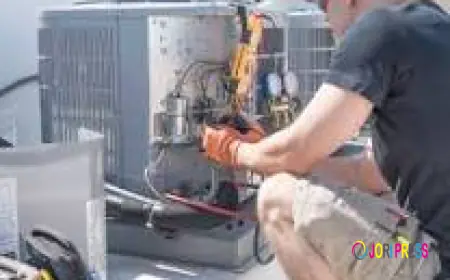Emerging Trends in Garbage Collection Vehicle Market 2030
The rapid pace of urbanization and population growth, particularly in developing countries, is a key driver of the Global Garbage Collection Vehicle Market.

The global garbage collection vehicle market is undergoing a transformative evolution, catalyzed by growing urbanization, industrial expansion, environmental regulations, and the pressing need for sustainable waste management solutions. According to industry analysis, the market stood at USD 13.93 billion in 2024 and is projected to reach USD 19.41 billion by 2030, growing at a robust CAGR of 5.74% during the forecast period.
This surge reflects a broader global commitment to cleanliness, environmental responsibility, and operational efficiency. Governments, municipal bodies, and private waste management firms are increasingly investing in advanced garbage collection vehicles equipped with smart technologies, ergonomic designs, and eco-friendly powertrains. Let’s explore the key trends, drivers, and dynamics reshaping this market.
Emerging Trends in the Garbage Collection Vehicle Market
1. Rise of Electric and Hybrid Garbage Trucks
Environmental awareness and stringent emissions regulations have triggered a notable transition toward electric and hybrid garbage collection vehicles. These vehicles offer reduced noise, lower operational costs, and zero tailpipe emissions, making them ideal for urban areas and municipalities striving for sustainability goals.
Leading companies are developing all-electric models with enhanced battery ranges and high payload capacities. Hybrid systems that combine conventional engines with electric motors are also gaining ground as transitional solutions.
2. Smart Integration with IoT and AI
Garbage trucks are no longer just mechanical systems; they’re becoming smart, connected machines. The integration of Internet of Things (IoT) sensors allows real-time monitoring of vehicle performance, bin fill levels, and collection routes. Artificial Intelligence (AI) further enhances waste segregation, sorting, and predictive maintenance, optimizing every aspect of operations.
This technological evolution minimizes fuel consumption, labor dependency, and inefficiencies in municipal solid waste (MSW) collection.
3. Automation in Waste Handling
The adoption of semi-automatic and fully automated garbage collection systems is accelerating. These vehicles reduce manual intervention, increasing safety for sanitation workers while boosting speed and efficiency. With robotic arms, automatic compactors, and self-cleaning mechanisms, automated trucks are becoming vital in modern city waste operations.
4. Compact Design for Urban Environments
To navigate congested city streets and densely populated areas, manufacturers are introducing compact, maneuverable vehicles without compromising load capacity. These smaller vehicles cater to tight access zones while retaining high-efficiency waste collection.
5. Customizable Modular Vehicles
Customization is another major trend. Waste management operators now seek vehicles tailored to specific regional needs—whether for residential routes, industrial parks, or remote rural areas. Modular chassis designs and adjustable load compartments allow greater flexibility and scalability.
Download Free Sample Report: https://www.techsciresearch.com/sample-report.aspx?cid=21172
Market Drivers Shaping Growth
1. Urbanization and Industrial Growth
The growing global urban population is significantly increasing municipal solid waste volumes. As cities expand and industrial activity surges, the need for efficient, scalable waste collection solutions becomes critical.
2. Environmental Regulations
Environmental protection regulations, such as emission caps and mandates for fleet electrification, are pushing governments and waste management firms to adopt low-emission vehicles. These mandates are reshaping the vehicle purchase and design strategies of municipal authorities.
3. Technological Advancement
The integration of GPS tracking, AI-based waste identification, and route optimization technologies are making garbage trucks smarter. These innovations improve collection frequency, reduce resource usage, and offer data-driven insights.
4. Public Health and Hygiene Awareness
The COVID-19 pandemic underscored the importance of clean public spaces. This renewed focus on public health and hygiene has catalyzed greater investment in efficient and hygienic waste handling vehicles across urban and semi-urban areas.
5. Government Initiatives and Funding
Governments around the world are incentivizing clean energy vehicle adoption, including garbage trucks. Public-private partnerships and grants for sustainable waste infrastructure are playing a pivotal role in accelerating the replacement of old fleets.
Industry Key Highlights
- Market Size 2024: USD 13.93 Billion
- Forecast Market Size 2030: USD 19.41 Billion
- CAGR (2024-2030): 5.74%
- Fastest-Growing Region: North America
- Dominant Segment by Technology: Semi-Automatic
- Leading Loader Type: Rear and Side Loaders
- Fuel Type Trends: Shift toward Electric and Hybrid
- Innovation Focus: AI, IoT, Automation, Ergonomics
- Key End Users: Municipalities, Private Waste Management Companies
Market Segmentation Overview
By Technology
- Manual
- Semi-Automatic (Fastest-Growing Segment)
Semi-automatic vehicles balance manual control with automation. Their adaptability, reduced cost, and reliability make them ideal for a range of operational conditions, especially in urban areas with diverse waste types and complex routes.
By Loader Type
- Front Loader
- Rear Loader
- Automated Side Loader
- Others
Rear loaders remain widely preferred due to their high compaction ratios and operational simplicity. However, side loaders are gaining attention for their automation compatibility and safety benefits.
By Type
- Light-Duty Vehicles
- Medium-Duty Vehicles
- Heavy-Duty Vehicles
Heavy-duty garbage trucks dominate the commercial and industrial sector, while light and medium-duty models are increasingly adopted for residential and localized waste collection.
By Region
- North America (Fastest-Growing)
- Europe
- Asia-Pacific
- Middle East & Africa
- South America
North America is leading due to aggressive investments in clean technology and smart infrastructure. Government programs support fleet electrification and real-time waste tracking technologies.
Competitive Analysis
The global garbage collection vehicle market is fiercely competitive, with both legacy manufacturers and tech-driven newcomers innovating aggressively. Companies are focusing on automation, ergonomic designs, fuel efficiency, and digitalization to differentiate themselves.
Major Players Include:
- AB Volvo – Known for its advanced electric waste truck platforms.
- Dennis Eagle Limited – Offers high-efficiency compact models for urban use.
- IVECO S.p.A. – Innovating in hybrid and LNG-based vehicle lines.
- Dulevo International S.p.A. – Specialist in urban waste solutions.
- FAUN Umwelttechnik GmbH – Strong in smart loader systems.
- Hino Motors, Ltd. – Integrating hydrogen fuel cell technologies.
- PACCAR Inc. – Offers scalable and customizable garbage trucks.
- Mack Trucks, Inc. – Pioneers in automated refuse vehicle systems.
- Daimler Truck North America LLC – Innovating with telematics and EV integration.
- International Motors, LLC – Provides cost-effective and reliable collection solutions.
These companies are forming strategic partnerships with municipalities, tech firms, and energy providers to build comprehensive waste management ecosystems.
Future Outlook: Toward Smart, Sustainable Waste Management
The next decade will see the garbage collection vehicle market evolve from utility-centric machines to fully integrated smart waste management systems. The convergence of green energy, digital transformation, and urbanization will shape vehicle design, functionality, and ownership models.
Key Future Trends Include:
- Fleet Electrification: Dominance of electric vehicles powered by renewable sources.
- AI & Robotics: Full automation in waste collection and sorting.
- Circular Economy Integration: Vehicles aiding in material recovery and recycling directly.
- Data-Driven Operations: Predictive analytics for maintenance and routing.
- Subscription-Based Ownership Models: Service-based offerings replacing ownership.
10 Benefits of the Garbage Collection Vehicle Market Report
- Comprehensive Market Forecast (2024–2030)
Understand future growth patterns, projections, and investment opportunities. - Segment-Level Analysis
Detailed breakdown by loader type, technology, and region. - Competitive Intelligence
Strategic insights into top market players and their innovations. - Emerging Trend Identification
Stay ahead with insights on IoT, AI, and electrification. - Investment Guidance
Inform strategic investments and partnerships based on data. - Regulatory Landscape Overview
Learn how global policies are reshaping waste management. - Regional Opportunity Mapping
Explore high-growth regions and tailored opportunities. - Technology Landscape Assessment
Track the evolution of semi-automated and electric solutions. - Infrastructure and Ecosystem Outlook
Understand support infrastructure like charging and service networks. - Customization Option
Tailored data and insights for unique business needs.
Conclusion
The global garbage collection vehicle market stands at the intersection of sustainability, technology, and urban development. As cities strive to become cleaner and smarter, waste management vehicles are becoming more than just carriers—they're pivotal players in public health, environmental preservation, and operational efficiency.
With a robust pipeline of innovation, supportive government policies, and increasing public awareness, the market is poised for transformative growth. Industry stakeholders who align early with smart, sustainable, and adaptive solutions will lead the way in shaping the future of global waste management.
Contact Us-
Mr. Ken Mathews
708 Third Avenue,
Manhattan, NY,
New York – 10017
Tel: +1-646-360-1656
Email: [email protected]
Website: www.techsciresearch.com
What's Your Reaction?
 Like
0
Like
0
 Dislike
0
Dislike
0
 Love
0
Love
0
 Funny
0
Funny
0
 Angry
0
Angry
0
 Sad
0
Sad
0
 Wow
0
Wow
0


















































